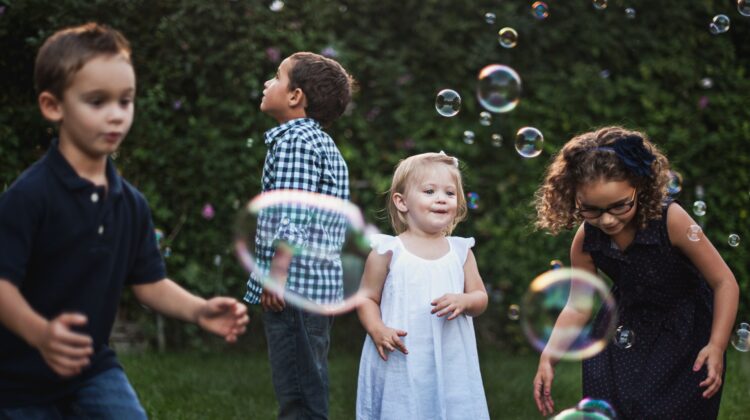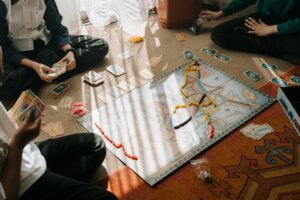
Good social skills are important for children to help them develop better peer relationships. It is vital to develop your kid’s social skills from a young age because these skills go beyond social acceptance. For instance, one study states that good social skills decrease stress in many kids in a proper daycare environment.
The social skills, however, require ongoing refinement with your kids’ growing age. But parents need to work on the development of social skills in kids with regular learning. These skills can be further strengthened with practice and effort. So, keep looking for the right teachable moments where you may encourage your children to do better in life.
Also, help them understand when to speak up and when to say quietly. For instance, we need to make them understand that speaking up when your friend is being bullied is the right thing to do while staying silent if a teacher scolds them for their bad behavior is also a skill they need to master.
Benefits of Social Skills in Kids
Here are some benefits of developing social skills in your kids:
1. Better Career and Educational Outcomes
According to researchers from Duke University and Penn State, children who are good at sharing, cooperating, listening, and following rules at the age of five are more likely to get employed by the age of 25.
2. Better Success in Life
Good social skills at a young age can help children to attain a brighter future. According to the American Journal of Public Health study, good social and emotional skills in kids when they are in kindergarten are a predictor of success in their adulthood.
3. Stronger Friendships
Kids with strong social skills are more likely to get along with peers to make friends conveniently. A study in the International Encyclopedia of the Social & Behavioral Sciences shows that childhood friendships are better for the mental health of kids. Social skills also help in developing empathy in kids. But it needs practice. You need to make your child practice imagining the way other people feel at your action. For instance, use a language like, “when you take away your friend’s favorite toy, how he/she would feel?” Interact with them about how people are different yet similar in terms of emotions.
Signs That Your Child Has Problems With Social Skills
Here are certain signs to look for to know whether your child has problems with social skills:
Perception:
- Does not understand body language or facial expressions
- Has less interest in social interactions
- Does not notice rejection actions by someone else
- Is a poor listener and doesn’t understand the point of others
Interpretation:
- Has difficulty with taking certain perspectives
- Is overly literal and cannot understand sarcasm
- Does not know the right way to greet people, gain attention, or request information
Response:
- Blurts out or interrupts while answering
- Shares information in very inappropriate manner
- Goes off the topic or often monopolizes conversations
- Does not adapt language to various people or situations
- Constantly fidgets or moves around
Things to Consider for Improving Social Skills

Form a better connection while playing with your child. Gradually, try to develop joint attention, shared interests, turn-taking, and cooperation for better social interaction. Meanwhile, as parents, help your child understand the following:
- Emotions: Make your child understand and display their emotions, and also understand the emotions of other people.
- Empathy: Make your child recognize how others also feel in different situations.
- Social skill groups: Introduce your child to certain social groups that run with the express purpose of improving social interactions with others.
- Social stories: Tell certain social stories to your child that he/she may find confusing or difficult to understand. The aim of the social story is to improve their understanding by explaining a certain situation and also suggesting the right social response for it.
How to Improve Social Skills in Children
Here are the five easy ways to improve social skills in kids:
1. Follow Their Interests
A child is more likely to enjoy something with others when they genuinely like it. Be it their favorite game, painting, playing an instrument, etc., they can make more friends while participating in activities they enjoy the most. They will be able to make connection with like-minded people in a comfortable environment. Although it is important that your child meet people who have different interests, spending time with children with the same interests can help build social skills.
2. Encourage Them to Ask Questions
When children are nervous or lagging in a conversation, they are likely to feel introverted. Hence, they are likely to struggle in more social situations in the future as well. As per the Center for Development & Learning, there are various ways to make kids initiate positive conversations with others. One simple way to do so is to encourage them to ask questions. Asking questions from others is the best way to find out about their interests while making a connection. However, encourage your child to ask questions that require detailed answers, not just simple ‘yes’ or ‘no’.
3. Pretend Play
Try pretend-play or role-play with children. It is another good way to make kids practice and develop their social skills more actively. For instance, make your child pretend to be an individual they feel difficult to interact with. It will give you some sort of idea about what that particular person is like or how your child sees that person. Now, ask your child to switch roles for, seeing how your child pretends to interact with that particular person. You can even suggest to your kid more easy ways to effectively talk with that person. Meanwhile, including body language, like making eye contact and smiling, while proposing ideas to your child can also be very effective.
4. Art of Sharing and Listening
As parents,you also need to make them understand the concept of sharing and active listening for better social skills development. However, sharing is difficult for young children. It is because it’s hard for them to share their things. But it’s critical to develop a child’s social skill, as it helps in making stronger and advance friendships.
Likewise, active listening is another important skill that kids need to learn at an early phase of their life. It’s challenging for young kids, but active listening helps in strengthening their social interactions and receptive language skills. It also helps them to understand others’ perspectives, stories, and gestures.
5. Develop Patience
“Patience is a virtue.” You may have heard of this phrase, and we want to tell you that it certainly is.
Although it’s normal for a child to get impatient, patience is one of the most vital and rewarding social skills for children. It is because patience is vital for various things, including relationships and friendships. It also helps them to stay calm while achieving and waiting for their big goals to come true.
For developing this skill, you need to make your child understand that every good thing takes time, and it comes to those who are patient enough. It takes a lot of practice, but once your child has developed this skill, he/she can face various situations in life.
6. Teach Empathy
When children have a good understanding of how people feel, they will also feel connected to them while forming positive bonds. For this, parents need to teach empathy to their kids. They can do so by making kids interact with different situations and scenes with their children. And, then ask how others would feel if they are in a specific situation. Meanwhile, you need to teach your kids to listen to others carefully. It is also an important part of empathy, as it involves concentrating on others and what they are trying to say. This will make your child a good listener, which is important for a healthy conversation.
7. Be a Good Role Model
It is also vital to be aware of the way you interact with others when your kid is around. It is because your child is likely to adopt the habits that you have. So, if you want your child to be empathetic, you also need to show genuine empathy for family and friends in life. According to the Center for Parenting Education, being a good role model needs forethought and conscious effort. So, be a good role model for your child to help him/her develop good habits and social skills.
Activities to Develop Your Kid’s Social Skills

Here are certain fun activities to try with your child to develop social skills:
1. Start a Staring Contest
Start a contest for making an eye contact with you for the longest time. It helps them to stay focused and also make them comfortable to make an eye contact while interacting with someone.
2. Eyes on The Forehead
For this activity, you have to put a sticker of an eye on your forehead. Ask your kid to look at the sticker. It may not be directly looking into your eyes but it’s training them to look in straight while interacting. Plus, it also gives them an idea to make an eye contact in a less threatening way.
3. Books about Idioms
You can encourage your child to read more books about idioms. To make the learning interesting, look for books with illustrations. It gives them a funny way to understand certain idioms.
4. Practice Decision Making Scenarios
Also, try to practice certain decision making scenarios to develop social skills. When you put your child in a situation where he/she has to make a decision, it gives them a sense of responsibility. It also encourages them to take initiative – be it in class or outside their class – to share their opinion or decision on a specific scenario.
5. Play Board Games and Card Games
Board games and card games are great to improve the brain skills of your child. It also puts them in various situations to make a move and a right decision to win a game. This is how they also get to learn decision making naturally.
6. Memory or Matching Game
You can consider writing down certain idioms on some cards and their meanings on another cards. Let your child pair an idiom with its accurate meaning. You could even add the picture of an idiom for visualizing how it would actually look like in a real situation.
7. Emotion Charades
Rather than using movie titles, typical words, or animal pictures, you can use emotions. Simply write down the feelings on pieces of paper. Take turns to pick a correct piece of paper when acting out a certain feeling written on it. You can even substitute words for pictures to show the right emotion to your child.
This way, they will learn to be more expressive and understand the right emotions of others as well.
8. Face It
In this activity, you have to work on your child’s social interaction. For this, you can try to mirror the actions with your autistic child. For instance, ask your child to imitate your actions, like sticking out the tongue, touching the nose, etc. Making funny faces to let your child copy them is also a good way to teach him/her about specific emotions which in turn will enhance your kid’s social skills.
9. Bingo/Matching Game
Another way to work on social interaction and developing their emotional level is with bingo/matching game. In this game, you can cut the pictures of certain emotions as a bingo boards. And, make a matching set of works or similar faces. Then, play a memory card game or matching game with your child to help him/her understand specific emotions.
10. Topic Game
You can even play a topic game with alphabet where each letter needs to begin with a word in specific theme, like vegetable or fruit: A—apple, B- banana, C- carrot. This game helps your child to stay focused on a specific topic.
Summary
Remember that it requires some time to boost your kid’s social skills. Good social skills are often developed over a lifetime. But if you feel your kid seems struggling with certain social skills than other kids, you need to consult a child psychologist. Professional guidance can help you and your child to timely build social skills in your children.
Leave a Reply